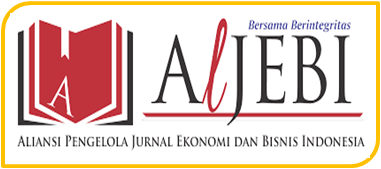Digipreneurship as an Effort to Strengthen The Digitalization of The Islamic Economy in Indonesia
Abstract
The digitization of the Islamic economy in Indonesia offers opportunities to strengthen economic growth based on Islamic principles. Through the development of sharia e-commerce platforms, technology-based financial services, and sharia-based fintech innovations, this digitization facilitates easier and faster access to Islamic products and services. This research uses three theoretical approaches: digital economy theory, entrepreneurship theory, and Islamic economic theory, with the aim of understanding the contribution and impact of digipreneurship in strengthening the digitalization of the Islamic economy in Indonesia and analyzing the principles of Islamic economics that can be applied in digital business. The research method used is qualitative with a descriptive content analysis approach and phenomenological design. The results highlight the importance of digipreneurship as an effort to strengthen the digitalization of the Islamic economy in Indonesia and integrate the principles of Islamic entrepreneurship into digital businesses. Digitalization of the Islamic economy through digipreneurship opens opportunities for Muslim participation in the digital market, encourages innovation, and promotes inclusive economic growth. The integration of Islamic values and principles into the digital economy is important in the digital era in Indonesia. Digipreneurship serves as a means to harness the potential of digital technology by upholding Islamic values, so that individuals and businesses can play an important role in advancing the digitalization of the Islamic economy, driving economic growth, and creating a prosperous future.
Keywords
Full Text:
PDFReferences
Ahmad. (2018). Desain Penelitian Analisis Isi (Content Analysis). Jurnal Ahmad, 1(1), 1.
Ahyani, H., & Slamet, M. (2021). Respon Dunia Barat Terhadap Ekonomi Syariah. Jurnal Perspektif Ekonomi Darussalam, 7(1), 1–21.
Aini, N., Martha, D., Amanah, N., & Putri, N. K. (2023). Pengembangan Kewirausahaan Digital di Indonesia. 14(2), 243–252.
Alam Choudhury, M. (1998). Studies in Islamic Social Sciens. Macmilan Press Ltd.
Ansori, A. (2016). Digitalisasi Ekonomi Syariah. ISLAMICONOMIC: Jurnal Ekonomi Islam, 7(1), 1–18. https://doi.org/10.32678/ijei.v7i1.33
Arfian, A., Cahyadi, C., Palasara, N., Yana, A. A., & Siregar, J. (2023). Pelatihan Digipreneurship pada Santri Pondok Pesantren Tahfidz Al- Qur ’ an Taqi Boarding School Setu Kabupaten Bekasi. 3(1), 1–4.
Atmajaya, R. S., & Mubarok, M. M. (2022). Digitalisasi Ekonomi Syariah Di Kalangan Kaum Milenial Untuk Pengembangan Ekonomi Syariah. Jurnal Inovasi Penelitian, 2(12), 4139–4144. https://stp-mataram.e-journal.id/JIP/article/view/1517
Davidson, E., & Vaast, E. (2010). Digital entrepreneurship and its sociomaterial enactment. Proceedings of the Annual Hawaii International Conference on System Sciences, February 2010. https://doi.org/10.1109/HICSS.2010.150
Etsa. (2020). Kewirausahaan Digital (Digital Entrepreneurship). Binus University. https://binus.ac.id/malang/2020/12/kewirausahaan-digital-digital-entrepreneurship/
Hair, J. F., Sarstedt, M., Ringle, C. M., & Mena, J. A. (2012). An assessment of the use of partial least squares structural equation modeling in marketing research. Journal of the Academy of Marketing Science, 40(3), 414–433. https://doi.org/10.1007/s11747-011-0261-6
Hartman, A. (2002). Why tech falls short of expectations. Optimize, 4(9), 20–27.
Hasan, M. I. (2002). Pokok-pokok Materi Metodologi Peneltian dan Aplikasinya. Ghalia Indonesia.
Hazwardy, D., & Gunawan, A. (2020). Pelatihan Digital Entrepreneurship Untuk Mewujudkan Generasi Milenial Berjiwa Wirausaha. Abdimas Dewantara, 3(1), 81–88. https://mail.journal.unjani.ac.id/index.php/jkwk/article/view/11
Hull, C. E., Hung, Y. T. C., Hair, N., Perotti, V., & Demartino, R. (2007). Taking advantage of digital opportunities: A typology of digital entrepreneurship. International Journal of Networking and Virtual Organisations, 4(3), 290–303. https://doi.org/10.1504/IJNVO.2007.015166
Itang. (2015). Teori Ekonomi Islam (M. N. Arifin (ed.)). Laksita Indonesia.
Mardani. (2011). Hukum Ekonomi Syariah di Indonesia (S. Ali Mifka (ed.); 1st ed.). PT Refika Aditama.
Muhammad, M. M. (2022). Pasar Digital Syariah Dalam Transaksi Bisnis Modern. El-Iqthisady: Jurnal Hukum Ekonomi …, 20(1), 88–95. https://journal3.uin-alauddin.ac.id/index.php/iqthisadi/article/view/29686%0Ahttps://journal3.uin-alauddin.ac.id/index.php/iqthisadi/article/download/29686/15139
Musnaini, Wijoyo, H., Indrawan, I., & Syahtriatna. (2020). Digipreneurship (Kewirausahaan Digital). CV. Pena Persada.
Mutiah, R. L. A. (2022). Pengaruh Digital Literacy dan Penggunaan E-commerce Terhadap Minat Berwirausaha Digital (Digital Entrepreneurship) Pada Mahasiswa Tadris IPS UIN Syarif …. In Repository.Uinjkt.Ac.Id. https://repository.uinjkt.ac.id/dspace/handle/123456789/64084%0Ahttps://repository.uinjkt.ac.id/dspace/bitstream/123456789/64084/1/11170150000081_REZI LARAS AYU MUTIAH - REZI LARAS AYU MUTIAH MHS 2017.pdf
Nur Annisa, B. (2022). Pengaruh Ekspektasi Pendapatan, Motivasi dan Lingkungan Keluarga Terhadap Minat Berwirausaha Digital Mahasiswa Fakultas Ekonomi dan Bisnis Islam UIN PROF. K.H. SAIFUDDIN ZUHRI PURWOKERTO.
Qardhawi, Y. (1997). Peran Nilai dan Moral Dalam perekonomian Islam (D. Hafidhudin (ed.)). PT Robbani Press.
Richter, L. M., Daelmans, B., Lombardi, J., Heymann, J., Boo, F. L., Behrman, J. R., Lu, C., Lucas, J. E., Perez-Escamilla, R., Dua, T., Bhutta, Z. A., Stenberg, K., Gertler, P., Darmstadt, G. L., Bouhouch, R. R., Cetin, Z., Chadwick, K., Das, J., Earle, A., … Yoshikawa, H. (2017). Investing in the foundation of sustainable development: pathways to scale up for early childhood development. The Lancet, 389(10064), 103–118. https://doi.org/10.1016/S0140-6736(16)31698-1
Soemitra, A. (2015). Kewirausahaan Berbasis Syariah. CV. Manhaji. http://repository.uinsu.ac.id/310/4/daftar pustaka.pdf
Sugiyono. (2010). Metode Penelitian Pendidikan (Pendekatan kuantitatif, kualitatif, dan R&D). Alfabeta.
Sumarno. (2022). Peranan Umat Islam dalam Perkembangan Ekonomi Syariah di Indonesia. Jurnal Pendidikan Dan Konseling, 4, 1349–1358.
Tap Scott, D. (1995). The_Digital_Economy_Essence_from_Dan_Tap. Choice : American Library Association.
Wave, V. (2014). Digital Economies In Emerging Markets. December, 1–18. http://vitalwave.com/wp-content/uploads/2015/09/Digital-Economies-In-Emerging-Markets-20141218.pdf
Winardi, J. (2008). Entrepreneur dan Entrepreneurship. In Entrepreneurial Leadership pada Pengusaha Mikro dan Kecil di Jawa Timur (p. 2).
DOI: https://doi.org/10.18860/miec.v3i2.24039
Refbacks
- There are currently no refbacks.

This work is licensed under a Creative Commons Attribution-ShareAlike 4.0 International License.
Editorial Office:
Megawati Soekarnoputri Building
Faculty of Economics
Jln. Gajayana 50 Telp (0341) 558881
E-mail: m-iecjournal@uin-malang.ac.id
UIN Maulana Malik Ibrahim Malang
Member of:
Indexed by:
Maliki Islamic Economics Journal under a CC BY SA 4.0 International License.
View My Stats


























